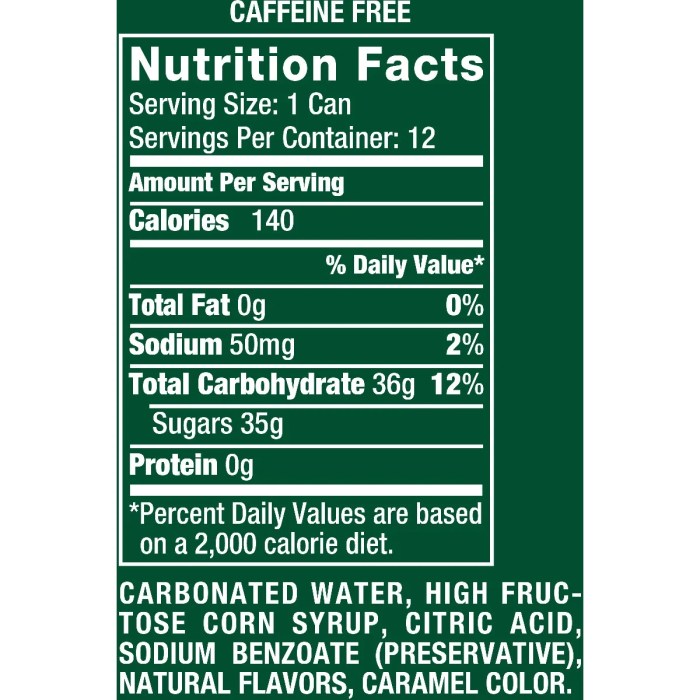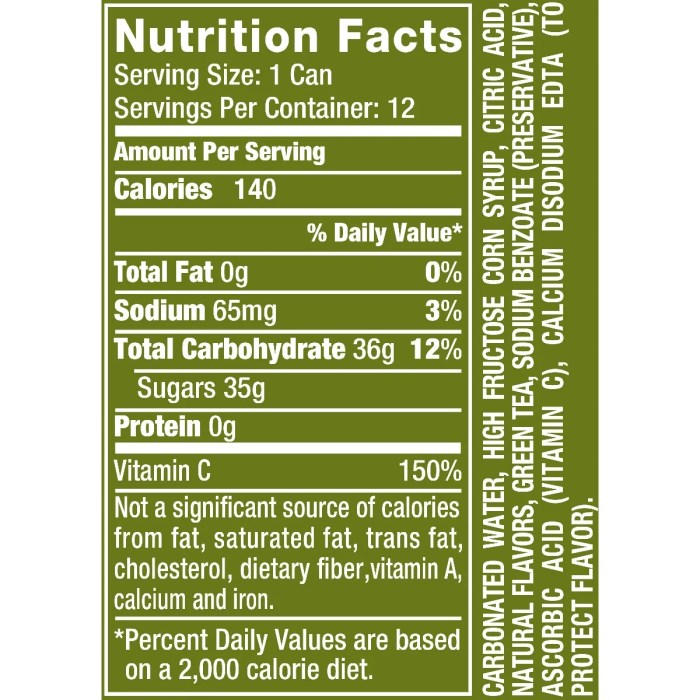
Ingredient Analysis of Canada Dry Ginger Ale

Nutrition facts canada dry ginger ale – Canada Dry Ginger Ale, a popular non-alcoholic beverage, boasts a simple yet intriguing ingredient list. Understanding its composition provides insight into its flavor profile and potential health implications. This analysis will delve into the specific ingredients, their roles, and their impact on the consumer.
Ingredient List and Functions
The typical ingredient list for Canada Dry Ginger Ale includes carbonated water, high fructose corn syrup, citric acid, natural flavors, caramel color, and sodium benzoate. Carbonated water provides the fizz and base for the drink. High fructose corn syrup acts as a sweetener, contributing to the beverage’s sweetness and overall taste. Citric acid adds tartness and acts as a preservative, enhancing the overall flavor profile and extending shelf life.
Natural flavors, a proprietary blend, create the characteristic ginger flavor. Caramel color imparts the amber hue, while sodium benzoate acts as a preservative to prevent microbial growth. The exact quantities of each ingredient are typically proprietary information, varying slightly depending on production batches and regional regulations.
Comparison to Similar Beverages
Compared to other ginger ales and similar carbonated soft drinks, Canada Dry’s ingredient list is relatively standard. Many competitors utilize similar sweeteners, such as high fructose corn syrup or sugar, and preservatives like sodium benzoate. However, differences may arise in the type and quantity of natural flavors used, leading to variations in taste and aroma. Some brands opt for more natural sweeteners like cane sugar or stevia, while others may include additional ingredients like extracts or spices to enhance the ginger flavor.
These variations reflect different manufacturing processes and target market preferences.
Potential Health Impacts of Ingredients
The health impacts of Canada Dry Ginger Ale’s ingredients are complex and multifaceted. High fructose corn syrup is a significant source of added sugar, potentially contributing to weight gain, type 2 diabetes, and other metabolic disorders if consumed excessively. Citric acid, while generally safe, can erode tooth enamel with prolonged exposure. Natural flavors, while often derived from natural sources, can sometimes contain artificial components or additives.
Understanding Canada Dry Ginger Ale’s nutritional profile is crucial for informed beverage choices. While it’s relatively low in calories and fat, a direct comparison reveals stark differences when considering the sugar content against something like mini oreos nutrition facts ; the latter boasts significantly higher sugar and fat levels. Therefore, mindful consumption of both beverages is essential for maintaining a balanced diet, especially given Canada Dry’s reliance on artificial sweeteners.
Caramel color, in some forms, has been linked to potential health concerns, though the specific type used in Canada Dry Ginger Ale is generally considered safe within reasonable consumption levels. Sodium benzoate, a preservative, has been the subject of some debate regarding potential health effects, although the amounts used in soft drinks are generally considered safe by regulatory bodies.
Moderate consumption is key to minimizing any potential negative impacts.
Nutritional Value per Serving
| Nutrient | Amount (per 355ml serving – approximate values may vary) |
|---|---|
| Calories | 150-160 |
| Carbohydrates | 39-40g |
| Sugars | 39-40g |
| Sodium | 20-30mg |
Nutritional Information and Serving Sizes
Canada Dry Ginger Ale, a refreshing beverage enjoyed by many, presents a simple nutritional profile. Understanding its nutritional content, particularly in relation to serving size and frequency of consumption, is key to making informed choices about its place in a balanced diet. Let’s delve into the specifics.
Nutritional Facts per Serving
A standard serving size of Canada Dry Ginger Ale is typically 355ml (12 fl oz). The exact nutritional information may vary slightly depending on the specific product and its packaging, so always refer to the label on the bottle or can. However, a general representation of the nutritional content per serving often includes: Calories: approximately 100-110; Total Carbohydrate: around 27-29g; Sugars: approximately 26-28g; Sodium: typically less than 10mg.
It’s virtually fat-free and protein-free. This profile highlights the beverage’s primarily carbohydrate-based composition, primarily from added sugars.
Implications of Multiple Servings
Consuming multiple servings of Canada Dry Ginger Ale daily significantly increases your overall sugar and calorie intake. For example, two servings would double the sugar and calorie count, potentially contributing to excess weight gain, increased risk of type 2 diabetes, and other health issues associated with high sugar consumption. Consider that the average recommended daily added sugar intake is significantly lower than what could be consumed through several servings of this beverage.
The lack of significant nutritional value beyond simple carbohydrates further reinforces the need for moderation.
Potential Nutritional Deficiencies and Excesses
Regular consumption of Canada Dry Ginger Ale, due to its high sugar content and lack of essential nutrients, can lead to several potential nutritional imbalances. The high sugar intake can displace the consumption of nutrient-rich foods, potentially leading to deficiencies in vitamins, minerals, and fiber. Conversely, it significantly contributes to an excess of simple carbohydrates and calories, increasing the risk of weight gain and associated health problems.
The lack of essential vitamins and minerals further exacerbates the potential for nutritional deficiencies if this beverage becomes a significant part of one’s daily fluid intake, replacing healthier options like water or unsweetened beverages. It’s crucial to remember that Canada Dry Ginger Ale should be enjoyed occasionally as part of a balanced and varied diet, not as a significant contributor to daily nutritional needs.
Ginger’s Role in Canada Dry Ginger Ale

Canada Dry Ginger Ale, a ubiquitous beverage, derives much of its character from ginger. While not a health tonic, understanding ginger’s role in the product, both in terms of flavor and any potential health implications, provides a more complete picture of this popular drink. This section will explore the presence and impact of ginger within Canada Dry Ginger Ale.Ginger contributes significantly to the distinctive flavor profile of Canada Dry Ginger Ale.
It provides the characteristic spicy, slightly sweet, and pungent notes that differentiate it from other carbonated beverages. The exact amount and type of ginger used in the production process, however, is proprietary information not publicly disclosed by the manufacturer. This lack of transparency makes a precise quantification of ginger content per serving difficult.
Ginger Extract Quantity in Canada Dry Ginger Ale
The precise amount of ginger extract or naturally-sourced ginger in a typical serving of Canada Dry Ginger Ale is not readily available to the public. While the ingredient list will usually indicate “natural flavorings” which may include ginger, the specific quantity remains undisclosed. This is common practice for many food and beverage manufacturers who protect their formulations as trade secrets.
One can infer, however, that the amount is relatively small, considering the relatively mild ginger flavor compared to beverages that prominently feature ginger as a primary ingredient.
Comparison of Ginger Content and Health Benefits Across Ginger Beverages
Comparing Canada Dry Ginger Ale to other ginger-based beverages reveals significant differences in ginger content and, consequently, potential health benefits. Beverages like fresh ginger juice or ginger shots typically contain substantially more ginger than a serving of Canada Dry Ginger Ale. These higher-ginger alternatives may offer more pronounced anti-inflammatory properties and potential digestive benefits associated with ginger’s bioactive compounds.
Canada Dry, with its lower ginger concentration and added sugars, primarily offers flavor rather than substantial health advantages attributed to concentrated ginger consumption.
Naturally Sourced Ginger vs. Artificial Ginger Flavorings, Nutrition facts canada dry ginger ale
The distinction between naturally sourced ginger and artificial ginger flavorings is crucial. Naturally sourced ginger, whether from fresh root or extract, contains a complex array of bioactive compounds, including gingerols and shogaols, that contribute to its flavor and potential health benefits. Artificial ginger flavorings, on the other hand, are synthetically produced compounds designed to mimic the taste of ginger without necessarily containing these beneficial components.
Canada Dry’s use of “natural flavorings” suggests the possibility of both natural and artificial components, leaving the exact nature of their ginger source unclear. The lack of explicit declaration further complicates accurate assessment of the overall ginger quality and its potential health impact.
FAQ Overview: Nutrition Facts Canada Dry Ginger Ale
Does Canada Dry Ginger Ale contain caffeine?
No, Canada Dry Ginger Ale is generally caffeine-free.
Is Canada Dry Ginger Ale gluten-free?
Yes, Canada Dry Ginger Ale is typically considered gluten-free. However, always check the label for potential cross-contamination concerns.
Are there different varieties of Canada Dry Ginger Ale with varying nutritional content?
Yes, there might be variations in the recipe depending on the region and specific product line. Always check the nutrition label on the specific bottle or can you are purchasing.
What are the potential long-term health effects of consuming Canada Dry Ginger Ale regularly?
Regular consumption of sugary drinks like Canada Dry Ginger Ale is linked to increased risks of weight gain, type 2 diabetes, and dental problems. Moderation is key.